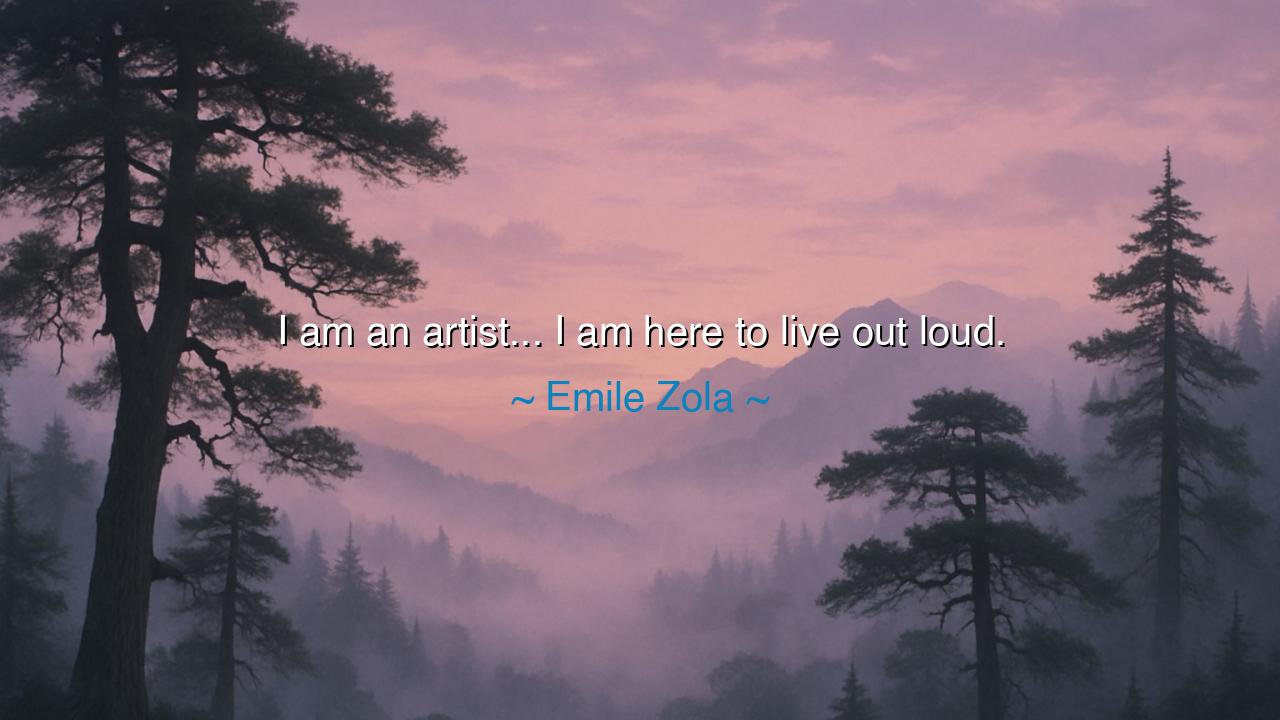
I am an artist... I am here to live out loud.






In the fire of his conviction, Émile Zola, the French novelist and defender of truth, once declared: “I am an artist... I am here to live out loud.” These words thunder across time, like a call from the heart of creation itself. Zola, who stood boldly against hypocrisy and injustice, believed that the artist’s duty is not silence, but expression — not to please the world, but to awaken it. To “live out loud” is to live truthfully, fearlessly, and without apology — to make one’s inner vision echo through the world, even when that echo disrupts comfort or challenges convention.
The origin of this quote lies in Zola’s unflinching spirit and his life as both writer and revolutionary. Born in 1840, he came of age in a France steeped in social tension and moral pretense. He witnessed the suffering of the poor, the corruption of power, and the suffocation of truth beneath the masks of propriety. Through his pen, he sought to strip those masks away. His novels — Germinal, Thérèse Raquin, Nana — were not merely stories; they were mirrors held to society, exposing its decay and its humanity alike. And when injustice struck in the infamous Dreyfus Affair, Zola risked his life to publish “J’Accuse,” a letter that shook France’s conscience. That was Zola living out loud — a man who believed that silence, in the face of wrong, was a form of death.
To live out loud, as Zola understood it, is not the same as living recklessly. It means to live authentically, to speak and create from the deepest truths of the soul. It means refusing to shrink beneath fear or conformity. The artist, in his view, is a vessel for something eternal — for beauty, for justice, for meaning — and his role is not to hide that fire but to give it form, to let it burn visibly in a world too often content with shadows. “I am here to live out loud,” he said, as though to remind every creator: art without courage is decoration, and life without expression is merely existence.
There is a parallel in the story of Vincent van Gogh, the painter of light and sorrow. His world rejected him, his peers dismissed him, and yet he continued to paint — in fire, in color, in anguish. Each stroke of his brush was his voice shouting into eternity. Though he sold not a single painting in his lifetime, he lived his truth without compromise. He, too, “lived out loud,” not in comfort but in faith — faith that to express what one feels deeply is a sacred act. And though the world was deaf to him in life, it hears him now in every star that swirls across his canvases.
Zola’s declaration also carries a moral challenge: to live out loud is not only the task of artists but of all who would live meaningfully. It is to refuse to hide behind fear or convention. It is to speak one’s truth even when the world prefers silence. It is to stand for what is just when others bow to convenience. For every human life, too, is a work of art — a composition of choices, words, and deeds. And if we are to live fully, we must live as artists do: courageously, creatively, and in defiance of the dullness that would make us mute.
The lesson, then, is this: Do not whisper your existence. Live out loud. Create boldly, speak truthfully, love passionately, and let your actions bear witness to what you believe. The world will often try to quiet you — through ridicule, through fear, through the weight of its expectations — but remember that even the softest candle can defy the dark. Silence may preserve safety, but expression preserves the soul.
So, my children, take Zola’s words as a torch for your own journey. Do not hide your light beneath the veil of modest fear. If you are an artist, paint or write as though the heavens depend on your voice. If you are a worker, build with integrity and purpose. If you are a dreamer, dream with audacity. Let your life be a testament to what it means to be awake. For as Zola declared, the purpose of art — and of life — is not merely to exist, but to exist loudly, to stand before the world and say, “This is who I am, and I will not be silent.”
And when your final hour comes, may you, like Zola, look upon your days and know: I did not live quietly. I lived as I was meant to live — fully, fiercely, out loud.






AAdministratorAdministrator
Welcome, honored guests. Please leave a comment, we will respond soon